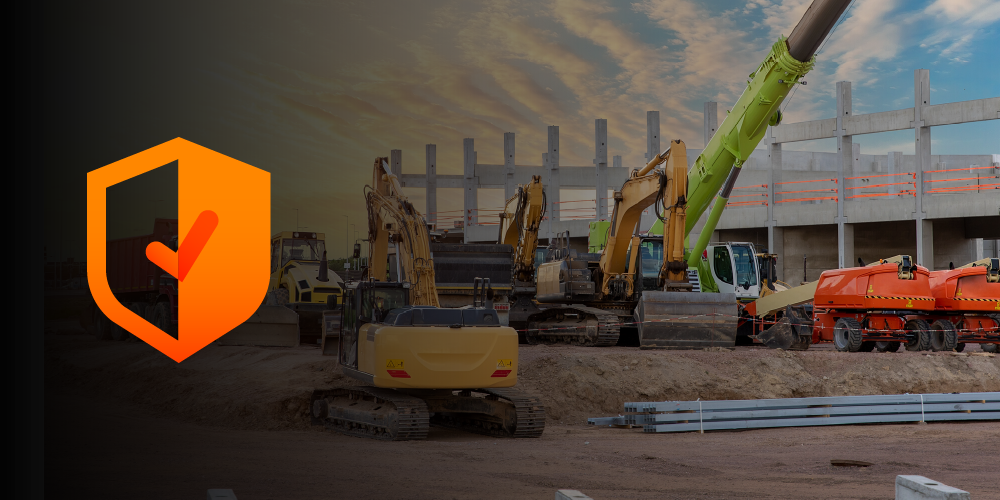— 4 min read
What is Equipment Floater Insurance for Contractors?

Last Updated Jan 6, 2025

Elizabeth Rivelli
Contributing Writer
12 articles
Elizabeth Rivelli is a freelance writer specializing in insurance and finance. Her writing has been featured in dozens of publications, including Investopedia, The Balance, Forbes, Bankrate, NextAdvisor, and Insurance.com. Elizabeth holds a degree in Communication Studies from Northeastern University. She lives in New England.

Melody Bell
Director of Underwriting
Melody Bell is Director of Underwriting at Procore. Previously, she spent 15 years as Director and Vice President for managing general agents in the U.S. and London, with a focus on construction GL, SDI and professional liability. Melody holds a bachelor's degree from the University of Southern California and a JD from USC Gould School of Law. She lives outside of San Bernadino, CA.
Last Updated Jan 6, 2025

Most contractors rely on tools and equipment to complete construction projects. But if something happens to those items, they can be expensive to replace. Contractors can benefit from purchasing an equipment floater to protect business property from damage and theft.
In this article, we’ll explain how equipment floaters work, what they cover and how much they cost.
Table of contents
What is an equipment floater?
An equipment floater provides insurance protection for movable business property that gets damaged or stolen. It covers portable tools and equipment that are transported, stored on the job site, or kept in another location.
Equipment floaters are a type of inland marine insurance, which is designed to protect business property regardless of where it travels on land.
These floaters are often added to a commercial property insurance policy. They can also be added to a business owner’s policy (BOP), which includes commercial property insurance with general liability insurance.
What does an equipment floater cover?
An equipment floater covers most of the tools and construction equipment that contractors transport to and from job sites. Here are some examples of items that are routinely covered by equipment floater insurance:
- Hammers
- Drills
- Saws
- Ladders
- Scaffolding
- Generators
- Compressors
- Excavators
- Skid steers
- Forklifts
- Computers
- Cameras
Contractors can get an equipment floater with all-risk coverage or named perils coverage:
- An all-risk policy provides the broadest protection, covering every risk except those specifically excluded in the contract.
- A named perils policy only includes coverage for hazards distinctly listed in the insurance agreement.
Equipment Not Covered by a Floater
Equipment floaters have limitations, and not all business property is covered. Below are some items that aren't typically covered by equipment floater insurance:
- Heating units
- Cooling units
- Windows
- Flooring
- Siding
- Cultured or natural stone
- Plumbing fixtures
- Plywood
- Decking
- Cabinetry
One of the main exclusions under an inland marine insurance policy is vehicles.
An equipment floater won’t cover work trucks, vans or cars — even though they’re considered business property and are movable.
Business-owned vehicles must be insured under a separate commercial auto policy, which provides third-party liability coverage.
Who needs equipment floater insurance?
Most contractors own business property that gets moved from one job to another. An equipment floater can help protect valuable business property regardless of where it’s located.
Below is a list of specialty contractors who may benefit from purchasing an equipment floater:
- Excavators
- Masons
- Carpenters
- Plumbers
- Electricians
- Painters
- Landscapers
- Roofers
- Concrete contractors
- Flooring installers
It’s also important to note that subcontractors who are listed as additional insureds on a general contractor’s (GC) insurance policy don't necessarily receive business property coverage.
Just because a GC has an equipment floater, doesn’t mean that their additional insureds are also covered. Subcontractors should get their own equipment floater if they have business tools or equipment to insure.
How much does an equipment floater cost?
The cost of an equipment floater varies and is different for every contractor. Here are some of the biggest factors that can impact the cost of this insurance policy.
Operating in High-risk Areas
An equipment floater may cost more for contractors who operate in high-risk areas. For example, a residential home framer might pay a higher rate in a coastal area than they would in a region not prone to hurricanes or flooding.
Value of Insured Items
The amount of equipment and value of the items that a business owner needs to insure is factored into their premium. The more business property that is insured under the policy, the more the contractor can expect to pay for their insurance floater.
Business Type
Businesses that own specialty tools often pay higher rates for equipment floater insurance. For instance, a woodworker who uses expensive specialized tools might pay more than an interior painter who needs to insure brushes, rollers, and sprayers.
Security Measures
The degree to which a business safeguards its business property can have an impact on the cost of insurance. For instance, rates might be cheaper for contractors who keep equipment in a facility that has a security system that is wired to police departments.
Equipment Floater vs. Installation Floater
Equipment floaters and installation floaters are important insurance policies for contractors, but they have some distinctions.
An installation floater covers the materials a contractor intends to install on a specific project, whereas an equipment floater protects the tools and equipment the contractor owns and uses on each project.
Installation floaters cover materials that contractors purchase and store temporarily, like lumber, shingles, and tiles. If these materials get damaged or destroyed in a covered peril, the installation floater will pay to replace them.
Courses about construction.
For construction.
Unlock your career potential with our free educational courses on Health & Safety, Data in Construction, and more.
Covering All Bases With a Floater
Many contractors spend a considerable amount of money on tools of the trade. Unexpected damage to those items can cause a major financial setback, especially for smaller businesses. An equipment floater helps protect contracting businesses from loss if their business property is destroyed by perils such as theft, vandalism, fire, and windstorms.
Because most commercial insurance policies provide limited coverage for business property, an equipment floater may help fill the gaps in foundational policies.
Was this article helpful?
Thank you for your submission.
83%
17%
You voted that this article was . Was this a mistake? If so, change your vote
Scroll less, learn more about construction.
Subscribe to The Blueprint, Procore’s construction newsletter, to get content from industry experts delivered straight to your inbox.
By clicking this button, you agree to our Privacy Notice and Terms of Service.
Thank you!
You’re signed up to receive The Blueprint newsletter from Procore. You can unsubscribe at any time.
Categories:
Written by

Elizabeth Rivelli
Contributing Writer
12 articles
Elizabeth Rivelli is a freelance writer specializing in insurance and finance. Her writing has been featured in dozens of publications, including Investopedia, The Balance, Forbes, Bankrate, NextAdvisor, and Insurance.com. Elizabeth holds a degree in Communication Studies from Northeastern University. She lives in New England.
View profileReviewed by

Melody Bell
Director of Underwriting
Melody Bell is Director of Underwriting at Procore. Previously, she spent 15 years as Director and Vice President for managing general agents in the U.S. and London, with a focus on construction GL, SDI and professional liability. Melody holds a bachelor's degree from the University of Southern California and a JD from USC Gould School of Law. She lives outside of San Bernadino, CA.
View profileExplore more helpful resources

Construction Equipment Rental Insurance: How & Where to Get Coverage
Contractors and construction businesses that rent equipment should consider getting construction equipment rental insurance. This type of insurance covers the cost of replacing rented tools and equipment if they get...

Understanding Construction Insurance: Actuarial vs. Underwriting Factors
Determining the price of construction insurance is complex, with much of the work happening behind the scenes. Most construction companies interact primarily with an insurance broker or agent, but actuaries...

Construction Insurance Pricing: What Determines the Cost of Insurance?
Construction is a risky and litigious business, and insurance can help mitigate the risks for builders and owners. Construction insurance is a valuable and frequently required tool, so understanding how...

Self-Insured Retention (SIR) in Construction Insurance Explained
Self-insured retention (SIR) is a mechanism in construction insurance policies that is often compared to a deductible. However, SIRs operate slightly differently and have unique benefits. Understanding how to navigate...
Free Tools
Calculators
Use our calculators to estimate the cost of construction materials for your next project.
Templates
Find a template to help you with your construction project tasks.
Material Price Tracker
Get the latest U.S. retail prices and view historical trends for common building materials.
Glossary
Explore key terms and phrases used in the industry.
